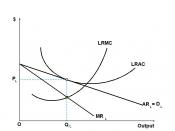Since the 12th century and the escalation of separate owner / managed business organizations, the assumption that firms maximises profits has been at the forefront of economic theory. Cyert and Hedrick (1972) stated:"The unmodified neoclassical approach is characterised by an ideal market with firms for which profit maximisation is the single determinant of behaviour. Thus predictions can readily be made by combining the description of the market with the results of maximisation of the relevant Lagrangian."In recent years their has been extensive literature by economists questioning the theory of profit maximisation, given that the standard "theory of the firm" is based upon rigid assumptions which can only exist in a perfect market. Tollison (2003) stated:'The debate about whether firms maximise profits serves as a purpose of forcing scholars to be more careful in framing maximisation hypothesis, and as a consequence, the profit-maximisation hypothesis is basically a non-issue today."Perhaps the most controversial assumption that compromises the neo-classical hypothesis is that firms always maximises profits (and minimise costs).
This is further explored by incorporating more recent managerial models in particular Baumol.
There are however a number of other generic managerial criticisms of the Neo-classical model, all of which have been widely investigated by economic literature.
The first criticism concerns the inevitable conflict of interest between management and shareholders. In the modern economy, where ownership and control of firms often lie with different groups of individuals economists have found that each stakeholder group has conflicting objectives, regarding the use of resources by the organisation.
Managers employed by companies have a contractual relationship with the owners of the company i.e. they are the shareholders agents. However if the interests of shareholders and managers differ, then management are likely to be selective in the information they provide to their shareholders, resulting in managers having...


